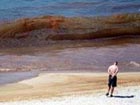| Videos | ? Latest |
|
? Feature | ? Sports | ? Your Videos |
Where did all the Gulf spill oil go?

It's one of the biggest mysteries of the BP Gulf of Mexico oil spill: What happened to all the oil? Despite the leak of millions of barrels of crude -- most of it seems to have disappeared. Reporter Jeff Napshin has some answers from Washington.
Despite months of oil pouring into the Gulf of Mexico -- it's recently become hard to tell if the oil is still there. But many scientists, like University of Maryland Distinguished Professor Rita Colwell -- a former Director of the U.S. National Science Foundation, thinks it is.
Prof. Rita Colwell, University of Maryland, said, "Yes.. there probably are layers of an oil water mixture that may be submerged."
Dr. Colwell supports a recent study from the National Oceanic and Atmospheric Administration which found up to 3/4s of the oil still in the Gulf. The report shows a huge plume of oil, about the size of Manhattan -- nearly 4,000 feet underwater, flowing southwest from the BP well.
But a previous government report from the National Incident Command, the group responsible for directing the response, suggested most of the oil is in fact gone -- either dissolving from dispersants, evaporating, or being eaten by micro-organisms.
Kenneth Green, American Enterprise Institute, said, "Oil is biodegradable. There's an entire ecosystem that feeds off hydrocarbons. In the Gulf you have seeps of oil and there's a population of bacteria that live on that oil. When you have a spill those bacteria ramp up exponentially."
And the warm waters of the Gulf would support this huge increase in bacteria -- as if they were gouging on an all-you-can-eat buffet.
"It's estimated that nearly five million barrels of oil leaked into the Gulf before they sealed the BP well in mid July. Federal officials closed beaches and shut down most of the area's fishing."
Professor Colwell believes the Gulf could return to normal within a few years. That's something Ken Green agrees with. He believes we underestimated the power of Mother Nature.
Kenneth Green, American Enterprise Institute, said, "I think nature has shown that ecosystems are much more resilient than those who go to the worst case scenario assume."
 0
0 






